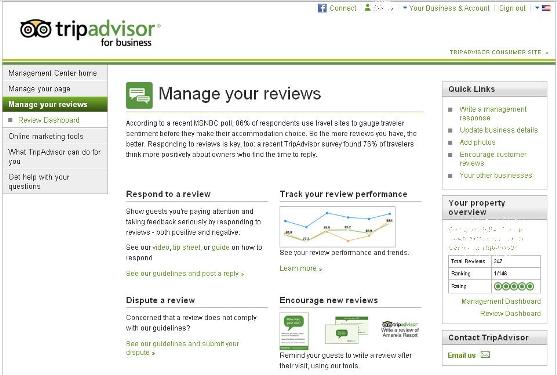In an increasingly technologically savvy world, it has become second nature for both business and leisure travelers to turn to the internet to research for a hotel destination, whether through a search engine, social media channel, brand website or OTA. The internet has made it fast and easy to research properties, view photos, read traveler reviews, and compare rates from virtually anywhere–at desktop computer in their own home, on their mobile phone or on a laptop computer. With the increased availability and access to information, hotels are not the only ones controlling their brand image and the content available to travelers and consumers.
The growing sophistication of online marketing in the travel industry has created more sophisticated consumers, who cut through the hype and marketing provided by a hotel and seek out independent opinions and reviews as their most influential source of information. In a recent survey conducted by TripAdvisor and Forrester Consulting, 81% of travelers said reviews were important when deciding which hotel to book, and almost half said they wouldn’t book a hotel unless it had reviews.
The relationship between OTAs, review sites and hotels has always been complicated, but with the proper knowledge and practices, the hotel and third party sites can grow to have a loving, successful relationship! A major part of regaining control of the content about your hotel and making a significant impact in the minds of travelers is to respond to the reviews that travelers have posted online, often known as reputation management.
Here are Blue Magnet’s top tips on how to respond to online traveler reviews of all types–the good, the bad, and the ugly!
Until proven guilty, assume all reviews are real and true

Do your due diligence in investigating each review. If a guest review is negative, investigate the issues presented by the guest and take the necessary steps to get to the bottom of the issue. Look to see if the guest issued a complaint while on property and ask your Director of Operations if there have been any issues in any departments that could attribute to the review. There are going to be false and misleading reviews posted about your hotel, but it can only help your cause by taking the high road and treating these reviews as real. If you do discover that the review is false, be sure to report it to the site with all of your supporting information in order to have the review removed as soon as possible.
Take a deep breath before submitting a response
It is easy to get defensive about your property and the criticism that a reviewer posts publically. But remember, you are representing the hotel brand, the property and all of its employees. Your response should demonstrate that all feedback, both positive and negative, is important to you by being polite and professional.
The guest is always right…online
No matter how much you believe this to be true or false deep down in your gut, your public online response must address the needs and concerns of the guests first. For example, a guest writes a review that they were unable to control the temperature of their room because the directions on how to use the thermostat were hard to understand. If you were to look at the directions, as part of the hotel staff they might be clear to you since you are familiar with the thermostat system. However, the guest is always right and there is usually a kernel of truth to extract from their experience, which you can use to improve your product. Take the opportunities that guest reviews provide to reevaluate the issues that guests bring up to strengthen your property thus enhancing the guest experience.
The following steps will help hoteliers structure their property’s online reviews and manage their online reputation more effectively:
- Sign up for notification emails Most consumer review sites allow management to receive notifications when a new review is posted. Ensure that the correct members of your hotel staff are signed up to receive these notifications and are available to act on behalf of the property. Preferably, a hotel’s response should be sent from the General Manager, Hotel Manager or Director of Guest Services.
- Respond in a timely manner Once you receive a notification that a new review has been posted, respond as soon as possible. This demonstrates to the guest that their feedback is important and that you value customer service.
- Remember one of the first rules your mother taught you: “Say please and thank you!” The very first line of the response should read:
“Dear [insert the username of the traveler to make it personal], Thank you for taking the time to write a review on [insert name of travel website]. We truly appreciate your feedback regarding your stay with us at [insert the name of your property] [and include the time/date of the stay if the review mentions it].”
It is important to express your genuine appreciation to guests who have taken the time to sit down, type out and submit their review about their experience at your property–good or bad. - Highlight the positive
Highlight the things that the guest noticed/appreciated during their stay.“Thank you for your kind words regarding the service you received from our Front Desk Guest Service Agent and the Bellman. We pride ourselves on superior customer service and I am glad to see that these team members went above and beyond to make your stay more comfortable. I’ll be sure to share your feedback with them and their supervisors.” - Address specific complaints
If the guest voices a complaint, your response should include an apology and direct acknowledgement of the specific complaint. You should also include a description of the action you are taking to improve the situation and what the guest can expect during their next visit.“I’m very sorry for the inconvenience you experienced when housekeeping did not refresh your room or provide clean towels or new amenities. I will address your concerns with the Director of Housekeeping to ensure this situation is avoided in the future. During your next stay with us, please do not hesitate to call down to the front desk and inform them of the situation as they will be happy to make sure a room attendant addresses your room right away.” - Be original and transparent
Avoid using a cookie cutter response for all reviews by personalizing your comments to each response you receive. This will demonstrate to the guest that each individual review and all feedback are important to you and that you took the time to actually read the review. - Don’t offer public service recovery
If a review is bad enough it warrants a very personal response. Take the conversation offline. Provide a direct phone number or an email address where the person can contact you directly about the issues they experienced. Since online channels protect the anonymity of the reviewers, management is not able to get the direct contact information of the guest. By providing your contact information you are inviting the guest to have their comments directly heard and addressed by the management. This will help you resolve the issue faster than working through the online system and it will alleviate the potential for miscommunication.“Dear Traveler, Thank you for taking the time to write a review on TripAdvisor. We truly appreciate your open and honest feedback about your experience at our hotel over the holiday. I’m very concerned with the comments you made specifically about the appearance of bedbugs in your guest room and I would welcome the opportunity to address your comments personally with you over the phone. Please feel free to call me at your earliest convenience. Your satisfaction and well-being are of most importance to us and we hope to rectify the situation as soon as possible. Thank you.”

According to TripAdvisor, 50 million travelers are utilizing the site every month, so it is crucial to your hotel business to be an active part of the online correspondence. Management responses give you the opportunity to engage with your past guests and market your property to future guests. Industry research shows that management responses are highly influential with travelers during the booking process. When an owner responds promptly and professionally to a review, addressing any specific complaints as well as the positive comments, it can make a big impact on prospective customers! While responding to reviews might seem like a trivial, grass-roots public relations effort, it does make a strong impression on travelers when it comes time for them to book.



